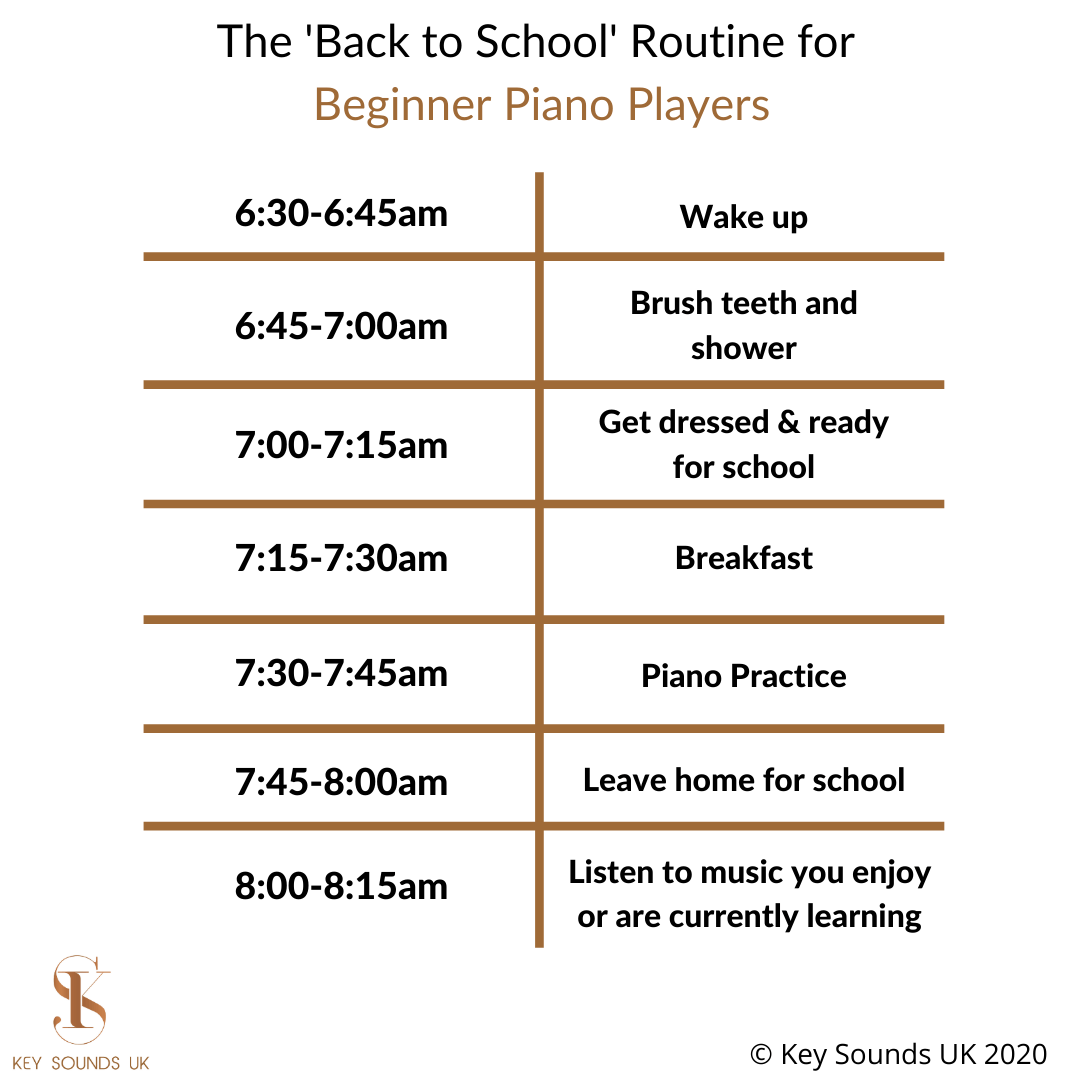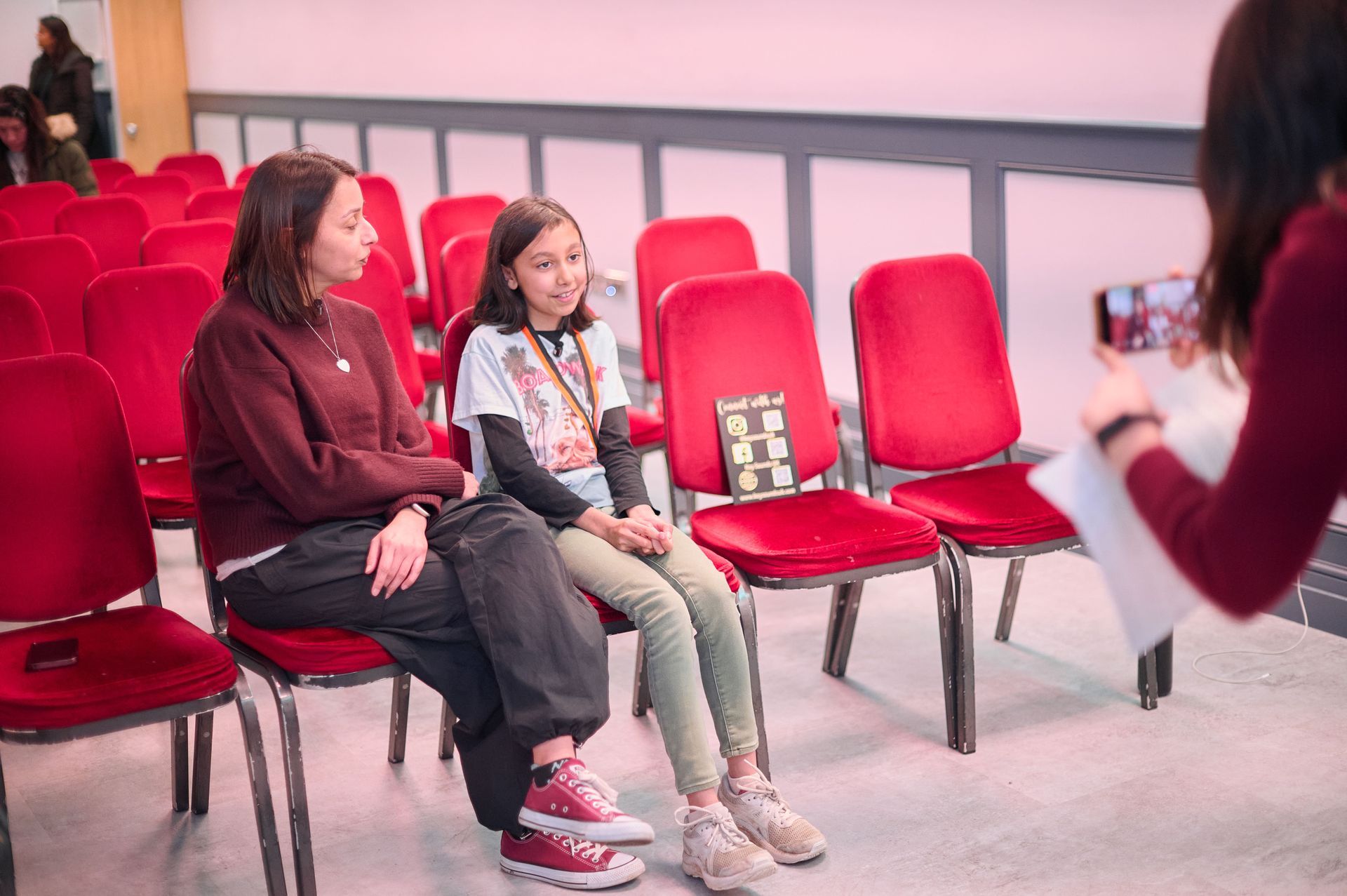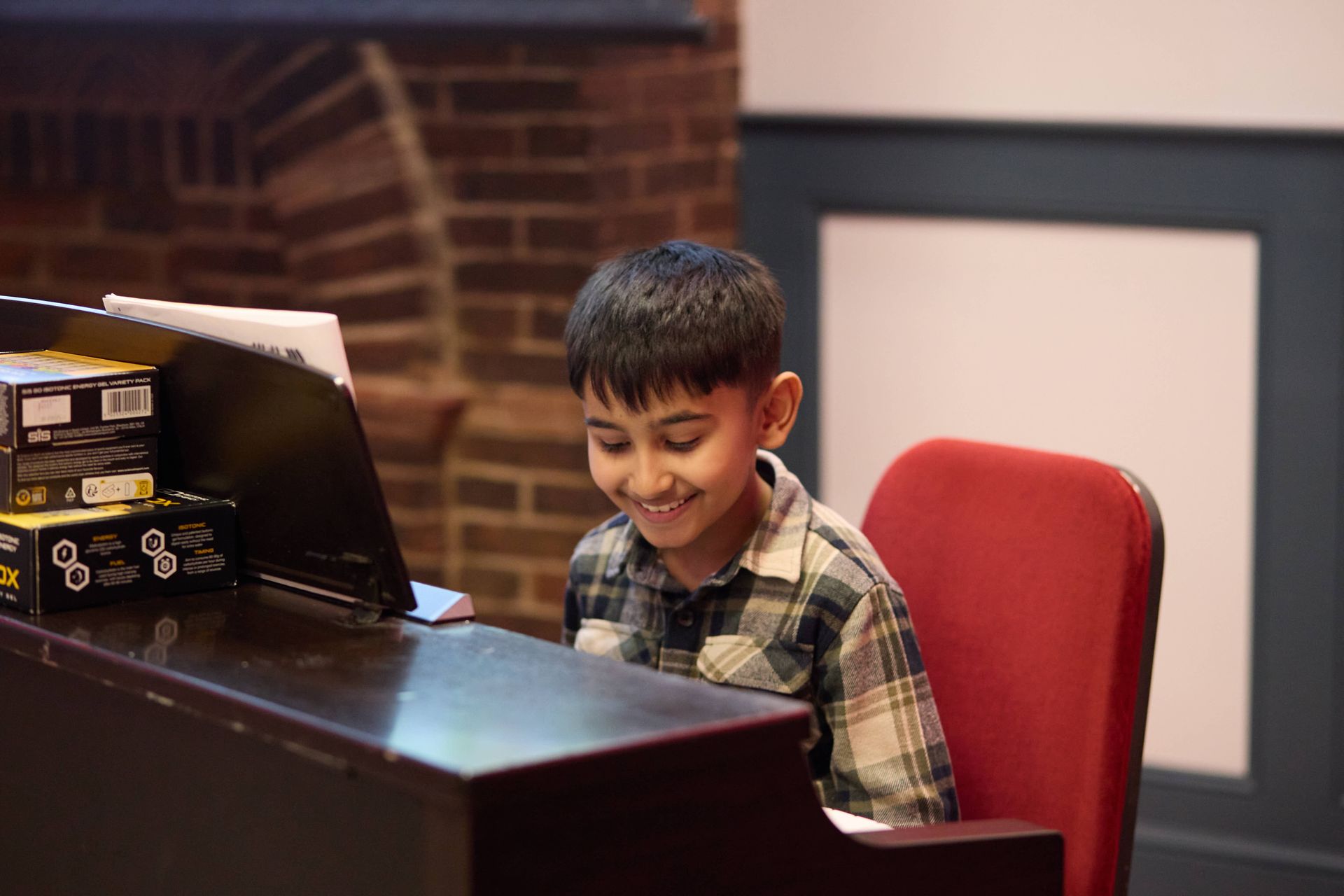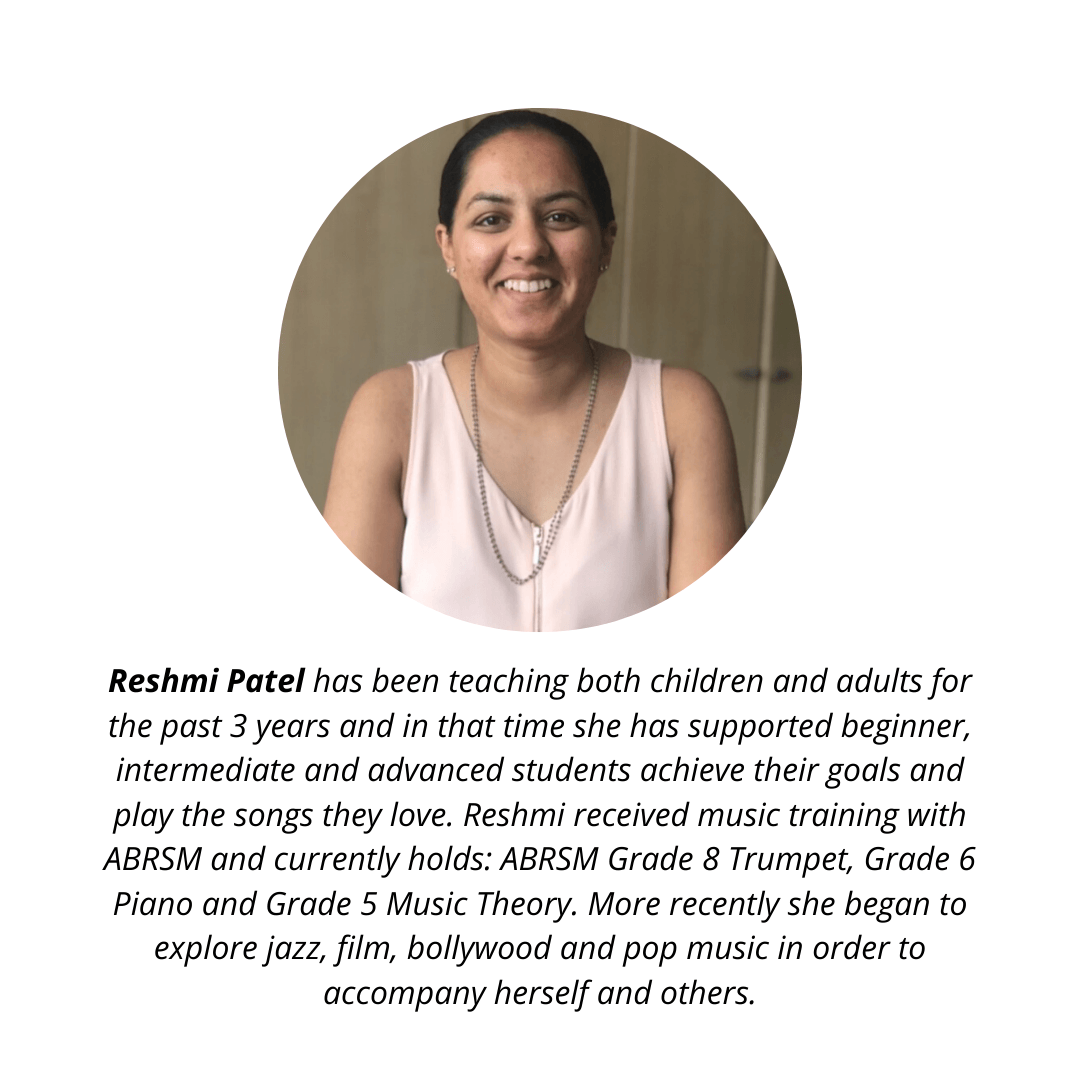Reshmi Patel • September 14, 2020
The Back to School Routine for Beginner Piano Players
For a lot of our students, they are returning back to school after five-six months!
According to our research and past experiences, we understand how difficult it can be to organise a student timetable once school is in full-swing. To overcome this issue, we’ve created an agenda of how students can incorporate music into their morning routine.
You are welcome to adjust the order of your morning routine and the length of time for each activity. We’d recommend at least 10-15 minutes of two musical activities per day for beginner musicians.

An important point to note is that you don’t have to constantly sit at your instrument to practice. In our view, the most optimal way to create an all-rounded and skilled musician is to implement small musical activities into your day.
Here are some examples of musical activities you could include in your day:
1. Instrument practice.
2. Listening to the piece you are learning.
3. Listening to music which inspires you.
4. Performing music at home to friends and family.
5. Performing at a local community center.
6. Reading the score of your music.
If you wish to know more about these hacks and resources, feel free to take a look around our website or connect with us directly.

If every piano lesson looks different, how do you know the teaching is high quality? Some weeks your child is focused and confident. Other weeks they may be tired, distracted, fidgety, or need more encouragement especially when they’re young. That variation is completely normal. High-quality piano teaching isn’t about every lesson looking the same. It’s about having the right support, structure, and professional oversight in place so learning continues through those natural ups and downs. What makes the difference often isn’t what happens in a single 30-minute lesson, it's everything working quietly behind the scenes to ensure consistency, care, and long-term progress. Teaching as a Profession, Not in Isolation In professional settings, teachers don’t work in silos and high-quality piano teaching is no different. Rather than operating alone, teachers work within a shared framework where: Expectations are aligned Teaching approaches are discussed and refined Progress is viewed over time, not lesson by lesson This doesn’t limit individuality or creativity, it strengthens it. It means your child benefits from collective experience, shared standards, and continuity, rather than relying on one isolated perspective. The Role of Headteacher Oversight Alongside the class teacher, there is also a headteacher who oversees someone who understands your child’s learning journey beyond a single lesson. This provides: Consistency across weeks and terms A second professional perspective when needed Clear continuity if changes ever occur For parents, this means reassurance. For children, it means stability. Clear Structure Without Rigidity High-quality piano lessons are supported by: Clear learning pathways Age-appropriate expectations Thoughtful pacing This allows teachers to adapt lessons when children are tired, distracted, or having an off week without losing direction. Structure doesn’t mean pressure. It means your child’s learning always has purpose. Why This Matters for Your Child When lessons are supported by systems rather than chance: Progress is steadier Confidence is protected Learning continues even during busy phases A high-quality piano lesson is never just about what happens in the room. It’s about the support surrounding it. If you ever want to understand how your child’s learning is supported behind the scenes, we’re always happy to explain. If you have any questions feel free to reach out and ask us!

From the outside, piano lessons can look simple: a weekly session, a teacher, and some practice at home. But what parents are really investing in extends far beyond those visible moments. Here’s what piano lessons include even when it’s happening quietly in the background. Ongoing Professional Thought Each lesson is shaped by more than the piece being played. Teachers consider: How your child responded last week Their confidence and energy levels What pace suits them right now Lessons are adjusted continuously and not delivered on autopilot. Long-Term Progress Planning Progress isn’t just about moving forward in a book. It includes: Developing independence Building coordination and listening skills Learning how to practise effectively Strong foundations now prevent frustration later. Emotional Guidance as Part of Learning Children learn through various approaches, depending on the child. High-quality teaching includes: Encouraging effort over perfection Normalising mistakes Supporting confidence during “wobbly” phases This emotional guidance often determines whether children continue learning long-term. Support Beyond the Lesson Behind each lesson is: Teacher reflection Professional discussion Oversight from the wider teaching team This ensures consistency and continuity even as children grow, change, or go through busy school periods. Why This Matters When you invest in piano lessons, you’re investing in: Stability Thoughtful teaching Long-term development What you don’t always see is often what protects progress the most. If you have any questions feel free to reach out and ask us!

“I want to be involved… but I don’t know what to ask.” Many parents tell us they hesitate to speak to their child’s piano teacher because they don’t read music or understand technical terms. They worry about asking the “wrong” question or sounding uninformed. The good news? You don’t need musical knowledge to have meaningful, helpful conversations. In fact, some of the most valuable questions are non-musical and they often reveal far more about your child’s progress than notes or grades. Here are five confidence-building questions, what each one tells you, and when to ask them. 1. “What is my child doing more confidently than before?” What this reveals: Confidence is one of the strongest indicators of long-term progress. This question helps you understand: Emotional growth Comfort at the piano Willingness to try independently Teachers may mention things like starting without hesitation, recovering from mistakes, or engaging more openly in lessons. When to ask: After 3-4 months, or whenever you’re unsure if progress is happening. 2️. “What’s one small thing we should notice improving over the next few lessons?” What this reveals: This gives you a clear checkpoint to look out for at home without pressure. It might be: Finding hand position independently Playing through a section without stopping Beginning a piece without help These small wins are often more meaningful than moving quickly through pieces. When to ask: At the start of a new term or after a holiday break. 3️. “How can we best support practice at home this month?” What this reveals: Support doesn’t mean correcting notes - it means reinforcing routines and expectations. The teacher may suggest: Keeping practice short and focused Encouraging a confident start Using the same language they use in lessons This question helps parents and teachers stay aligned and reduces frustration on both sides. When to ask: When practice starts to feel inconsistent or tense. 4. “What should we not worry about right now?” What this reveals: This is a powerful reassurance question. Teachers can help you let go of: Perfection Comparing progress to others Rushing ahead too soon Understanding what’s normal at your child’s stage can instantly reduce anxiety. When to ask: Any time doubts creep in especially if you’re comparing your child to others. 5. “How will we know when they’re ready for the next step?” What this reveals: Progress isn’t just about books or grades it’s about readiness. This question clarifies: What skills need to be secure first How confidence and consistency factor in Why waiting can sometimes be beneficial It also shows your child that progress is thoughtful and earned, not rushed. When to ask: Before discussing grades, longer lessons, or changes in structure. A Reassuring Note for Parents You don’t need to ask many questions just the right ones. Open, non-musical questions: Build trust with the teacher Give you clarity and confidence Help your child feel supported rather than pressured Remember: teachers value engaged parents not musical ones. If you’re ever unsure what to ask, start with curiosity rather than correctness. A simple, honest question often leads to the most helpful conversation. If you have any questions feel free to reach out and ask us!

